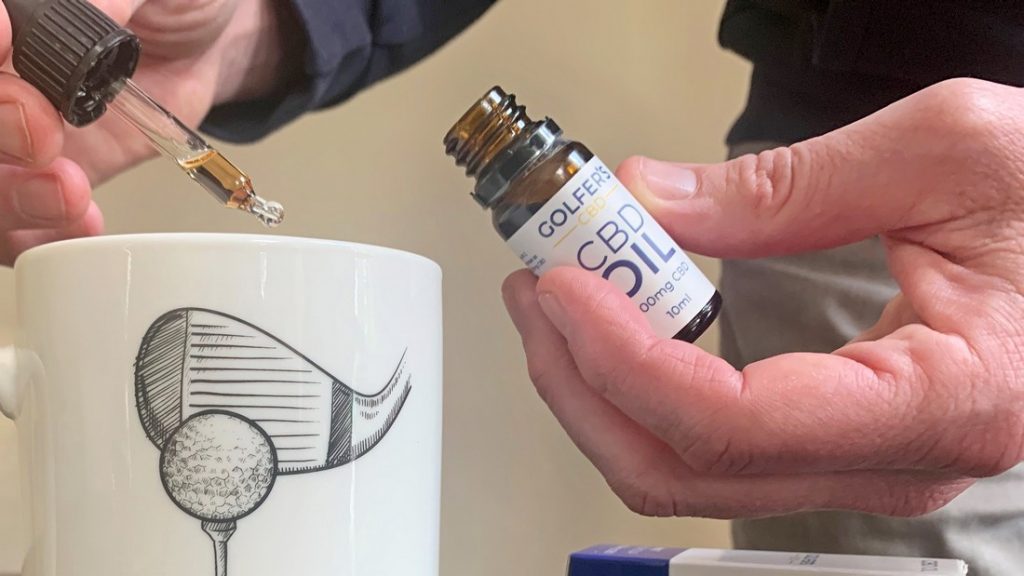CBD stands for cannabidiol, a product of the cannabis plant, but not the one that gets you high.

That’s THC (tetrahydrocannabinol) but the cannabis plant produces 113 other cannabinoids, of which CBD is one. Entirely legal and the subject of intensive research in recent years for an array of medicinal benefits.
Remarkably if you put any number of health conditions into Google with CBD as a treatment the results are vast. Already licenced in some medications CBD looks to be set as a novel treatment in everything from mental health conditions, cancer, epilepsy, arthritis and even in relieving the side-effects of chemotherapy.
But will it really help lower my handicap, stay cucumber calm after a 3-putt from 8 foot or allow me to reach yet unrealised levels of frustration and disappointment by enabling me to play more golf?
CBD is certainly gaining credibility in many sports. Cyclists are using CBD for endurance, it’s widely used in gyms for the same reason and even UFC fighters are flying the CBD flag.
If this product of the cannabis plant can trick the human body’s mood and our stress response we could be enjoying our golf in a whole new light.
Could a couple of drops of oil or a high-strength gummy leave me unflustered by a triple bogey start in the medal, laughing off a skulled chip across the green or maintaining concentration after a 2.5 hour front 9? If it can then it certainly has the potential to find its way into golf bags all over the country.
Whether to try CBD is a personal choice but, if you do dip your toe in the water, how do you know the quality of the CBD you are buying and that it’s 100% safe to consume?
A BBC programme Trust me, I’m a Doctor which aired in February 2020 carried out independent analysis of several CBD products available online and on the High Street. Only around 20% of the products independently analysed contained the correct amount of CBD, many contained far less than stated and one product which claimed on the bottle to contain 500 milligrams of CBD actually showed barely detectable amounts (0.00075%) of the main ingredient.
More worrying than the incorrect amount of CBD were the traces of THC (the psychoactive ingredient) found in two CBD products, these significantly exceeded the recommended maximum daily dosage set by the European Food Standards Agency.
CBD products should also be made from distillate, rather than isolate. CBD distillate is the expensive ingredient but essential due to its potency and purity. Isolate is a cheaper alternative used by some manufacturers so beware that in this market cheaper is unlikely to mean better.
So there are companies to avoid but also companies supplying high-quality CBD products, the question is how to spot the difference. If you decide to try CBD to bring your handicap down a shot or two this season, or just for overall wellness on and off the golf course, we have come up with a 5 point checklist that should ensure you are buying high quality CBD from a reputable source.
Five point safety plan:
1. Check the products are made from CBD distillate.
2. Does the company reveal the origin of their CBD and carry out third party testing. If they do the certificates should be publicly available and confirm both CBD concentration and THC levels.
3. A full list of each product’s ingredients should be available on the web site.
4. Does the company offer secure card processing and payment facilities? If they do this means the Directors have passed stringent bank checks to supply safe CBD products. Beware of any company asking you to make transfers direct to their bank account.
5. Do the products have batch numbers providing a trace back to the laboratory where they were produced.
If the company selling CBD products passes this 5 point checklist you can be confident you are purchasing good quality products and that they are safe to consume.
I have recently purchased CBD oil from a company which passed the 5 point checklist. Having already experienced some of the benefits the oil will definitely be in my bag when we get back on the tee.
